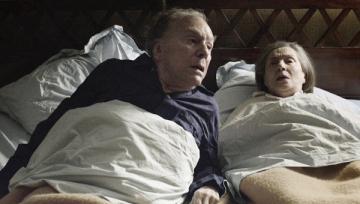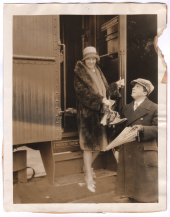'Amour,' a moving love story about life and death, deserves all of its Oscar attention
It's not the death, it's the dying that's so hard -- and constitutes the ultimate test of love.
That is the somber subject of Austrian director Michael Haneke's profoundly moving "Amour," and the challenge faced by its octogenarian protagonists.
Georges (Jean-Louis Trintignant) and Anne (Emmanuelle Riva) are affluent, cultivated Parisian music teachers, married for half a century. At the outset, they're attending a concert, afterward discussing the "incredible semiquavers in the presto."
But next morning, something is wrong. Anne won't answer her husband at breakfast. "Qu'est-ce qu'il y a?" Georges asks. She is taken to the hospital, then returns home -- paralyzed on one side. Stricken in more ways than one, she begs him not to hospitalize her again. He promises and takes sole charge of her care thereafter.
Director Haneke depicts her excruciating decline in what seems almost like real time, immersing us in the bedroom darkness and slow silences of their circumstance. Patient and devoted Georges exercises her leg, washes her hair, assists in the bathroom .... They are both such well-bred, civilized people with such dignity in the face of such indignities. Small bursts of irritation are always followed by "I apologize." Grim ruminations are leavened by wry exchanges.
"What would you say if no one came to your funeral?" Anne asks Georges.
"Nothing, presumably," he replies.
Their daughter, Eva (Isabelle Huppert), is not so sanguine. She lives abroad with her family and belatedly returns to second-guess her frail father's home handling of mother. "What now?" she demands. "Things will go steadily downhill, and then one day it will be over," he says.
Before it's over, however, there will be more than one brilliant scene affirming Anne's life rather than death. Best of them is the visit of her vacuous, self-absorbed protege, whom she asks to play a bagatelle. He thinks she means some lowercase bagatelle (defined as a musical trifle). In fact, she means one of the glorious Beethoven Op. 126 "Bagatelles" that she taught him. He can't or won't really do it.
No matter. She plays it much better in her imagination.
"Amour" is nominated for an amazing five Oscars: best director and screenplay, best foreign language film, best picture and best actress. Ms. Riva, 85, is the oldest person ever nominated in that category. (She was the French New Wave star of "Hiroshima, mon amour" back in 1959. One of her rivals this year, Quvenzhane Wallis, is the youngest-ever nominee, at age 9, for "Beasts of the Southern Wild.")
Mr. Haneke wrote this screenplay for Mr. Trintignant -- another French film icon, now 82, who memorably starred in "A Man and a Woman" (1966), "Z" and "My Night at Maud's" (1969) and Bertolucci's "The Conformist" (1970). He is particularly fine here in a gorgeous scene (with "2001" roots) involving a pigeon who gets into the house. It was shot 12 times, said Mr. Trintignant, because Mr. Haneke "kept trying to direct the bird."
"Amour" is more situational than narrative. Mr. Haneke creates and focuses solely on two intensely real people with no account of their previous life or of any outside characters. Mr. Trintignant's performance is fearlessly frail but composed. Ms. Riva does everything right in the dying that Hilary Swank did wrong in "Million Dollar Baby."
As a good movie should, "Amour" has generated heated debate: Is it too pretentious? Is life beautiful because of death, rather than in spite of it?
Either way, it's the great love story of the year. Says the unsentimental Mr. Haneke: "For me, what mattered was how to deal with the suffering of a loved one." Anne's suffering -- rendered not histrionically but realistically -- lets the viewer decide whether Georges does the right or wrong thing, and whether his love's labor is lost or found.
Mr. Haneke's previous films, most notably "The White Ribbon" (2009) and "The Piano Teacher" (2001) with Ms. Huppert, have been fascinating and disturbing. This one is even more so. American movies never go there. Its relentless honesty and exquisite performances are magnificent.
Although emotionally downbeat, with a shocking turn at the end, it wants not to depress you but to make you ponder your own similar or potential situations -- past, present or future.
I thought about my own mother toward the end of her life, under the home care of my father. A feisty, witty lady all her life, she now rarely spoke. One day he teasingly asked, "Do you love me a little?" She nodded yes. He pushed his luck with, "Why do you love me?" A spark returned as she said: "Because you're the only one around."






